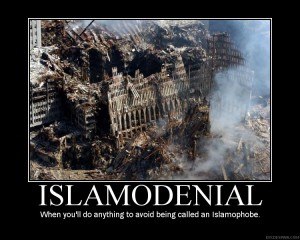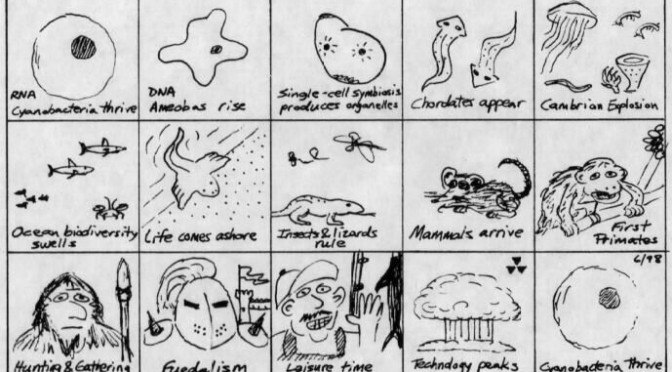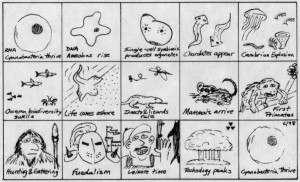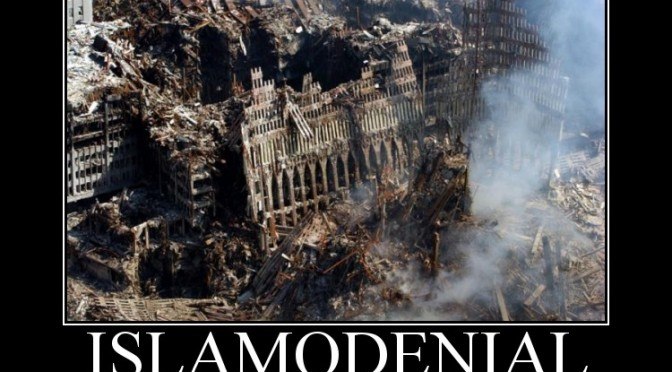 A few things the jihadis don’t want said, journalists won’t say, and moonbats don’t want to know.
A few things the jihadis don’t want said, journalists won’t say, and moonbats don’t want to know.
Who founded Islam, when and where?
There were pagan traditions in Arabia, particularly among those based in the trading centers, such as Mecca and Medina. Kaaba, the black rock at Mecca, was worshipped by certain tribes with a circling ritual that was later borrowed by Muhammad’s followers. Likewise, Allah was the name that had been given to the moon god, many centuries before Muhammad’s time.
Muhammad later created Islam based on these crude pagan practices as well as basic theological elements of Christianity and Judaism according to his own (often inaccurate) understanding. His erroneous interpretation of Christianity, for example, is often attributed to his early experiences with fringe cults in the Palestinian region.
Muhammad was born around 570 AD in Mecca. He grew up poor and orphaned on the margins of society, which was controlled by tribal chiefs and trading merchants. He worked for his uncle as a camel herder. Although his uncle had some standing in the community, Muhammad himself did not rise above his lowly station until he was 25, when he met and married a wealthy widow who was 15 years older.
Having now attained a comfortable lifestyle and the idle time that wealth affords, Muhammad would wander off occasionally for periods of meditation and contemplation. One day, at the age of 40, he told his wife that he had been visited by the angel Gabriel. Thus began a series of revelations which lasted until his death. The Qur’an is based on the oral traditions of these revelations. The Hadith is a collection of narrations of the life and deeds of Muhammad. The Sunnah is the said to be his way of life.
With his wife’s influence and support, Muhammad began trying to convert those around him to his new religion – an amalgamation of Judeo-Christian theology and pagan tradition that grew more sophisticated over time. In the beginning, he did his best to compromise his teachings with the predominant beliefs of the community’s elders, such as combining all 300 of their idols under the name “Allah,” although it wasn’t enough to prevent the resentment of the influential leadership, which mocked his humble background while fearing his influence (with good reason).
At first, he was only successful with friends and family. After twelve years, “the street preacher” could only boast about 70 determined followers, called Muslims, who followed him to the community of Medina after they were chased from Mecca by persecution.
It was at Medina that his message began to become more intolerant and ruthless as he gained the power to be so.
What is the Koran?
In some Westerners it engenders other emotions. For Gibbon it was an “incoherent rhapsody of fable,” for Carlyle an “insupportable stupidity,” while here is what the German scholar Salomon Reinach thought: “From the literary point of view, the Koran has little merit. Declamation, repetition, puerility, a lack of logic and coherence strike the unprepared reader at every turn. It is humiliating to the human intellect to think that this mediocre literature has been the subject of innumerable commentaries, and that millions of men are still wasting time absorbing it.”
What does it say?
The Quran contains dozens of verses that call Muslims to war with nonbelievers. Some are quite graphic, with commands to chop off heads and fingers, and kill the infidels wherever they may be hiding. Muslims who do not join the fight are called ‘hypocrites’ and warned that Allah will send them to Hell if they do not join the slaughter.
These verses are mostly open-ended, meaning that they are not embedded within historical context (as are nearly all of the Old Testament verses of violence). They are part of the eternal, unchanging word of Allah, and just as relevant or subjective as anything else in the Qur’an.
What is naskh?
This idea is crucial as a guide to the relationship of the Qur’an’s peaceful passages to its violent ones. Suras 16, 29, 52, 73, and 109 — the sources of many of the Qur’an’s verses of peace and tolerance — are all Meccan. That means that many Muslims, guided by commentators such as those above and the imams who teach from them, see these suras only in light of what was revealed later in Medina. Being the last or next-to-last sura revealed, sura 9 is generally understood as being the Qur’an’s last word on jihad, and all the rest of the book — including the “tolerance verses” — must be read in its light.
How did Islam spread?
Abu Bekr, the first successor of the Prophet Mohammed, was head of the Moslem community from 632 to 634. He set about patching up the internal unrest between tribes. Then Omar, caliph (head of the Moslem community) from 634 to 644, initiated an explosive expansion of Islam. He seized Syria, then Jerusalem and finally Damascus in 638 after having defeated Heraclius. In 635, other Arab troops launched an assault on the Sassanian Empire, and crossed the Euphrates. The downfall of the empire was well underway when the Arab horsemen dealt the deathblow to the Sassanid dynasty and overran Persia first entering Ctesiphon in 637. Successive victories were to follow. They emerged victorious from the engagement at Nahavand in 642, which left the way open for them to enter the Iranian plateau. The conquest of Persia continued with the fall of Afghanistan (651) and then Transoxiana (674).
What caused the Crusades?
The most immediate cause for the Crusades is also the most obvious: Muslim incursions into previously Christian lands. A “Crusade” had been underway on the Iberian peninsula since 711 when Muslim invaders conquered most of the region. Better known as the Reconquista, it lasted until the tiny kingdom of Grenada was reconquered in 1492.
In the East, Muslim attacks on land controlled by the Byzantine Empire had been going on for a long time. After the battle of Manzikert in 1071, much of Asia Minor fell to the Seljuk Turks, and it was unlikely that this last outpost of the Roman Empire would be able to survive further concentrated assaults. It wasn’t long before the Byzantine Christians asked for help from Europe, and it’s no surprise that their plea was answered.
A military expedition against the Turks held out a lot of promise, not least of which was the possible reunification of the Eastern and Western churches, should the West prove capable of defeating the Muslim menace which had for so long plagued the East. Aside from that, however, was the fact that if Constantinople fell then all of Europe would be open to invasion, a prospect that weighed heavily on the minds of European Christians.
Another cause for the Crusades was the increase in problems experienced by Christian pilgrims in the region. Pilgrimages were very important to European Christians for religious, social, and political reasons. Anyone who successfully made the long and arduous journey to Jerusalem not only demonstrated their religious devotion, but also became beneficiaries of significant religious benefits. A pilgrimage wiped clean one’s plate of sins (sometimes it was a requirement, the sins were so egregious) and in some cases served to minimize future sins as well.
It’s all so confusing.
Misconceptions about the Crusades are all too common. The Crusades are generally portrayed as a series of holy wars against Islam led by power-mad popes and fought by religious fanatics. They are supposed to have been the epitome of self-righteousness and intolerance, a black stain on the history of the Catholic Church in particular and Western civilization in general. A breed of proto-imperialists, the Crusaders introduced Western aggression to the peaceful Middle East and then deformed the enlightened Muslim culture, leaving it in ruins. For variations on this theme, one need not look far. See, for example, Steven Runciman’s famous three-volume epic, History of the Crusades, or the BBC/A&E documentary, The Crusades, hosted by Terry Jones. Both are terrible history yet wonderfully entertaining.
So what is the truth about the Crusades? Scholars are still working some of that out. But much can already be said with certainty. For starters, the Crusades to the East were in every way defensive wars. They were a direct response to Muslim aggression—an attempt to turn back or defend against Muslim conquests of Christian lands.
Christians in the eleventh century were not paranoid fanatics. Muslims really were gunning for them. While Muslims can be peaceful, Islam was born in war and grew the same way. From the time of Mohammed, the means of Muslim expansion was always the sword. Muslim thought divides the world into two spheres, the Abode of Islam and the Abode of War. Christianity—and for that matter any other non-Muslim religion—has no abode. Christians and Jews can be tolerated within a Muslim state under Muslim rule. But, in traditional Islam, Christian and Jewish states must be destroyed and their lands conquered. When Mohammed was waging war against Mecca in the seventh century, Christianity was the dominant religion of power and wealth. As the faith of the Roman Empire, it spanned the entire Mediterranean, including the Middle East, where it was born. The Christian world, therefore, was a prime target for the earliest caliphs, and it would remain so for Muslim leaders for the next thousand years.
With enormous energy, the warriors of Islam struck out against the Christians shortly after Mohammed’s death. They were extremely successful. Palestine, Syria, and Egypt—once the most heavily Christian areas in the world—quickly succumbed. By the eighth century, Muslim armies had conquered all of Christian North Africa and Spain. In the eleventh century, the Seljuk Turks conquered Asia Minor (modern Turkey), which had been Christian since the time of St. Paul. The old Roman Empire, known to modern historians as the Byzantine Empire, was reduced to little more than Greece. In desperation, the emperor in Constantinople sent word to the Christians of western Europe asking them to aid their brothers and sisters in the East.
That is what gave birth to the Crusades. They were not the brainchild of an ambitious pope or rapacious knights but a response to more than four centuries of conquests in which Muslims had already captured two-thirds of the old Christian world. At some point, Christianity as a faith and a culture had to defend itself or be subsumed by Islam. The Crusades were that defense.
What’s going on in Gitmo?
Who’s there?
Why?
What about the torture?
“If a guy’s salad isn’t right, I’ll make a phone call to try and get him the correct salad,” the guard said. “To hear that we mistreat them … frustrates you sometimes, because you go out of your way so much to make sure these guys are taken care of as far as medicine, any dental care they need, any nutrition.
“I don’t think people realize how hard we try to keep the detainees as safe and as well cared for as we do, because ‘fair, firm and impartial’ is exactly what we do here,” he said.
The abuse?
Officials said al Qaeda inmates have attacked American guards on a daily basis. During the 12-month period that ended in August 2006, authorities reported 3,232 incidents of detainee misconduct. They included 432 assaults with bodily fluids, 227 physical assaults and 99 efforts to incite a disturbance or riot.
Al Qaeda inmates have been taught to lie about Camp Delta and claim torture. Officials cited a terrorist training manual known as the Manchester Document and seized by British authorities in 2000. The manual directs al Qaeda operatives to make false claims of torture and mistreatment. More than 340 people have been released from Camp Delta.
What are Al Qaeda’s goals?
The main mission for which the Military Organization is responsible is:
The overthrow of the godless regimes and their replacement with an Islamic regime. Other missions consist of the following:
1. Gathering information about the enemy, the land, the installations, and the neighbors.
2. Kidnaping enemy personnel, documents, secrets, and arms.
3. Assassinating enemy personnel as well as foreign tourists.
4. Freeing the brothers who are captured by the enemy.
5. Spreading rumors and writing statements that instigate people against the enemy.
6. Blasting and destroying the places of amusement, immorality, and sin; not a vital target.
7. Blasting and destroying the embassies and attacking vital economic centers.
8. Blasting and destroying bridges leading into and out of the cities.
Why?
The young men returning to Allah realized that Islam is not just performing rituals but a complete system: Religion and government, worship and Jihad [holy war], ethics and dealing with people, and the Koran and sword. The bitter situation that the nation has reached is a result of its divergence from Allah’s course and his righteous law for all places and times. That [bitter situation] came about as a result of its children’s love for the world, their loathing of death, and their abandonment of Jihad [holy war].
Unbelief is still the same. It pushed Abou Jahl- may Allah curse him-and Kureish’s valiant infidels to battle the prophet – God bless and keep him – and to torture his companions – may Allah’s grace be on them. It is the same unbelief that drove Sadat, Hosni Mubarak, Gadhafi, Hafez Assad, Saleh, Fahed -Allah’s curse be upon the non-believing leaders – and all the apostate Arab rulers to torture, kill, imprison, and torment Moslems.
These young men realized that an Islamic government would never be established except by the bomb and rifle. Islam does not coincide or make a truce with unbelief, but rather confronts it.
The confrontation that Islam calls for with these godless and apostate regimes, does not know Socratic debates, Platonic ideals nor Aristotelian diplomacy. But it knows the dialogue of bullets, the ideals of assassination, bombing, and destruction, and the diplomacy of the cannon and machine-gun.
The young came to prepare themselves for Jihad [holy war], commanded by the majestic Allah’s order in the holy Koran. [Koranic verse:] “Against them make ready your strength to the utmost of your power, including steeds of war, to strike terror into (the hearts of) the enemies of Allah and your enemies, and others besides whom ye may not know, but whom Allah doth know.”
 There are just a few points I review in my head whenever the urge arises to cry and give into the influence of anything the left has to say about foreign policy or international politics. Self-pity is in fact the key to their mindset. Rather than spin into such a narcissistic black hole I turn my attention instead to one or more of the following vexing facts:
There are just a few points I review in my head whenever the urge arises to cry and give into the influence of anything the left has to say about foreign policy or international politics. Self-pity is in fact the key to their mindset. Rather than spin into such a narcissistic black hole I turn my attention instead to one or more of the following vexing facts:






